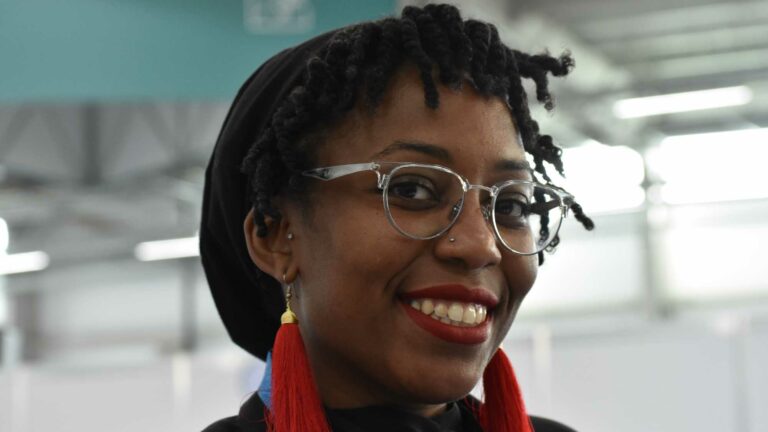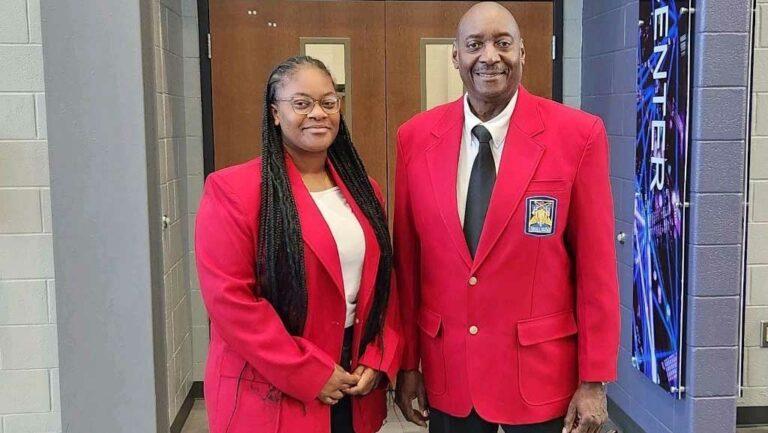Photo by Jakob Menendez.
(Note to non-gamers: The following feature contains a variety of gaming terminology. Please see glossary below to level-up your knowledge of video game verbiage.)
Juan Cubides has been interested in technology since … well … since before he can remember. “My parents tell me the story of being three years old and walking toward the family computer and just turning it on by myself,” the 18-year-old laughs. Cubides’ early years were spent in his home country of Colombia, South America. There, it wasn’t just technology that captivated him; he also loved to draw and was obsessed with movies, cartoons and games from the United States. Especially games. “’Super Mario Bros.’ was my first,” he reveals with a wistful hint of nostalgia.
When Cubides arrived in New York at 11, he remembers feeling like he was inside a video game. “It was definitely like a whole new world,” he says. “It was a little scary, you know? Walking around, you could definitely tell that this was not Colombia.”
Cubides’ mother, Heidy Ramirez, had brought her children to the United States in the hopes of providing them with better opportunities. After settling in Massachusetts, it soon became clear to Cubides just how much his mom was willing to sacrifice to wrestle those opportunities into reality. “She went from being a successful wedding planner in Colombia to working at a restaurant as a cashier and washing pans,” he says, pride and respect in his voice. “She worked hard.” That example inspired Cubides to work hard, too. After all, if his mom was going to sacrifice for the sake of his opportunities, he better be ready to take advantage of them when they arrived.
Opening Cinematic*
“I remember the second I walked in,” Cubides recalls of his first day of junior high school in the U.S. “I could tell, ‘Man, I’m really different from everyone else here.’ I felt out of place. A little intimidated.”
Intimidated … but not deterred.
Cubides instinctively knew one of those mom-made opportunities was right in front of him. He committed himself to his school’s English Language Learner (ELL) courses and began adapting to a new culture.
By the time he was a sophomore at Lynn Vocational Technical Institute (LVTI), Cubides was pursuing his interest in computers through the school’s Information Technology program. He’d come a long way already, but English teacher and SkillsUSA advisor Jason McCuish recognized even more as-yet-unrealized potential, and he encouraged Cubides to join SkillsUSA.
At first, the student was hesitant. “I was kind of used to not doing anything after school,” he explains. “I was enjoying just doing my homework and then dropping everything and playing video games for the rest of the day.”
Mom, however, saw opportunity. “She told me to do it,” Cubides laughs. “She thought it would look good on a resume, so I said, ‘Fine, why not?’”
Boss Fight*
Cubides expected SkillsUSA to be “another time-sucking after-school activity” with a lot of — as a gamer might say — uninspired grinding.*
Wrong.
“The first project I worked on was making care packages for homeless people and essential workers during the pandemic,” he remembers fondly. “It made me realize the importance of community service and teamwork and just how much of a difference we can really make.”
Cubides experienced his most transformative SkillsUSA activity when McCuish asked him to help his fellow chapter members create and lead a presentation about racial bias. It’s helpful to understand the level of anxiety this provoked in Cubides by framing it in the context of a video game: Think Pac Man with a gang of ghosts at his back, no flashing pellets in sight.
“It was terrifying for me,” Cubides says. “Especially in the current political climate and during the pandemic, that was really the last thing I wanted to do for my first time doing any sort of public speaking.”
Intimidated … but not deterred.
Cubides steeled himself to his accepted — albeit unwelcome — responsibility. While he felt as if “my heart was going to jump out of my mouth” at the start of the first presentation to teachers in his school, he soon began to relax and realize not only that he could do this — he was doing it.
“That moment kind of changed me and made me realize that my voice does actually have power,” Cubides says. “You hear that a lot, but I never thought it applied to me. Now, I think if I hadn’t done that, I wouldn’t be the person I am today.”
Power-Up*
Today, Cubides is a freshman at the University of Southern California (USC), where he’s studying game design … on a full-ride scholarship. That’s right: The hobby he cut back on to make time for SkillsUSA may now become his career thanks in part to the skills he learned in SkillsUSA.
During high school, Cubides realized he was “more interested in the artistic side of technology.” Playing and being inspired by games was no longer enough; Cubides now had a passion to make them. Realizing that dream would require him to do something no one in his family had done before: attend college. Early research revealed that USC was the number one gaming program in the country. When Cubides saw the cost, however, the school plummeted to just about last in terms of financial feasibility.
He applied anyway “just to see what they’d say.”
They’d say a lot.
Challenge Mode*
Weeks after applying, Cubides received an email from the school asking him to participate in an interview process that could result in a partial or full scholarship, an opportunity Cubides didn’t even know existed when he applied.
Another boss fight with anxiety was looming, but Cubides was ready. His SkillsUSA experience had helped prepare him. “I was like, ‘All right, this is the interview of my life,’” he says with a touch of the same determination he must’ve felt that day. “‘I can’t screw this up.’”
The SkillsUSA Framework skills Cubides learned as a member helped guide him as he studied, prepared questions, submitted a portfolio of his art and decided on a special shirt he’d wear for the interview. “They said I could wear anything I want,” he explains, “so I thought I’d wear something that shows my passion for games.” The shirt in question represented Cubides’ favorite game: “No More Heroes,” created by Goichi Suda, better known to the gaming world as “Suda51.” While wearing a gaming T-shirt to a potentially life-changing interview would be frowned on in most cases (to put it mildly), Cubides’ bold choice turned out to be — pun fully intended — a game-changer.
Once Cubides finished asking his well-thought-out questions with confidence and purpose, he turned things over to the panel of two. One of them was surprised Cubides didn’t ask a specific question. “It was the head of the gaming department,” Cubides laughs, “and he said, ‘You didn’t ask me if I knew Suda51.’”
Cubides thought he’d misheard. He hadn’t. Not only did the head of the department know the famed developer, but he’d worked with him on the first “No More Heroes” game. He also mentioned that Suda was someone the department could bring in as a guest speaker.
When the interview ended, Cubides confides that “I couldn’t stop shaking.”
Two months later, he received the news he’d only dared hope for: His interviewers saw the same potential his SkillsUSA advisor had once seen, and Cubides was going to USC — on a full scholarship — to pursue his passion. “I just couldn’t believe it,” he says. “I got my dream school with a full tuition, and I’ll be doing that for most of my life, you know? It’s incredible.”
“In SkillsUSA, you’re genuinely doing something good to be part of your community.”
– Juan Cubides
New Game Plus*

Though currently a freshman, Cubides is already making big post-graduation plans, one of which was influenced in part by his experience creating the racial bias presentation in SkillsUSA. “I want to build my own indie game development studio to open doors for other minority game developers,” he says.
“People like me, like Colombians, we have horrible, horrible representation in media. We’re usually represented as drug dealers or criminals. My hope is to open that window for people from Latin America and just people from other races in general to create their own representation and just put their stories out there. It’s exciting for me to think that I will have the skills to be able to represent my country and show the world that we are more than just Pablo Escobar and coffee and soccer games … and be able to help other people from all over the world do that, too.”
Those efforts to lift up other voices aren’t constrained to video games, though. At SkillsUSA’s 2022 National Leadership & Skills Conference, Cubides volunteered to help launch the SkillsUSA Catalysts program, designed to bring awareness to diversity, equity and inclusion topics in SkillsUSA chapters and schools. He was also named the vocational student of the year at LVTI in 2022.

Cubides’ mom, father (who remains in Colombia), stepfather and two siblings are incredibly proud of his accomplishments, and his mom’s proclamation that SkillsUSA would “look good on a resume” has proven to be a celebrated understatement.
“SkillsUSA helped me out so much,” Cubides affirms. “Just learning how to speak to people, how to present professionally and knowing that you never look as nervous as you feel. And knowing how to work with people, too. That’s definitely a skill you want to have in a field like game development.”
“In SkillsUSA, you’re genuinely doing something good to be part of your community,” he continues. “I get how it feels to want to be a shut-in and just stay away from the world and do your own thing. But looking back, I don’t consider that a way to live, because you’re not really contributing anything to your society. SkillsUSA has meant a lot to me in the sense that it’s taught me a lot of valuable life lessons that I continue to use to this day. It’s not just a group you’re a part of, it’s a family. And I know that sounds cliche, but it really is a family.”
“That’s why we moved here,” his mother says. “So you could have this chance.”
Level gained. New skills acquired.
Glossary
- Opening Cinematic: The opening movie in a video game that sets the context for the game’s story.
- Boss Fight: The moment in a game where the playable character faces a very difficult foe called a “boss.” Players can’t progress to the next level until the boss is defeated.
- Grinding: What gamers consider to be a boring process of performing menial, repetitive tasks to slowly gain skills for their character.
- Power-Up: Something within a game that grants new abilities or skills to the player.
- Challenge Mode: A game mode that ramps up the game’s difficulty through specific challenges that a player must complete within a limited time frame.
- New Game Plus: An option to play a game again, but this time with all the attributes, skills and abilities a player earned on their first play-through.








